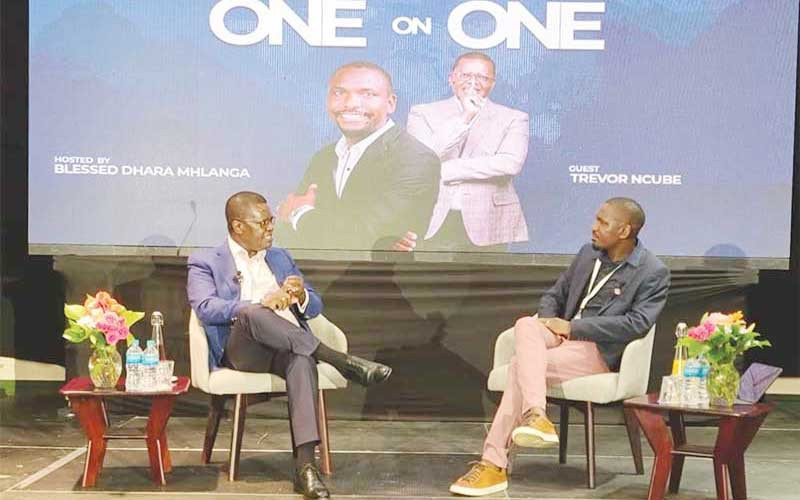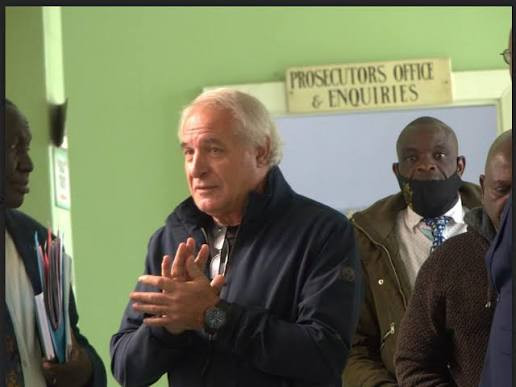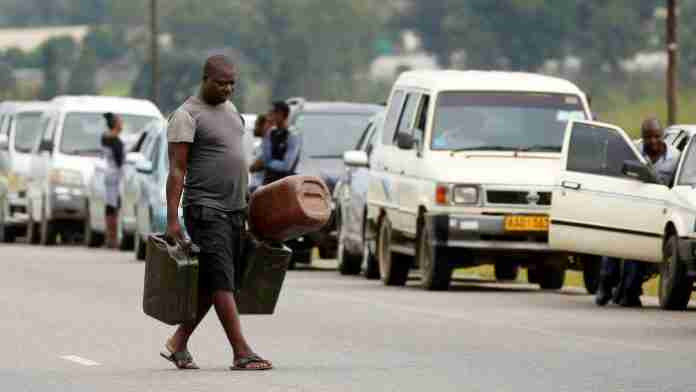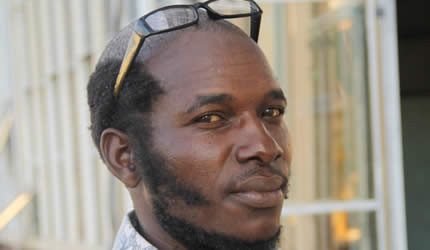
There was a reversal of roles at the In Conversation with Trevor Ideas Festival held in Nyanga late last year when the host of the show and Alpha Media Holdings chairman Trevor Ncube became the interviewee.
Ncube (TN) shared his journey in journalism and business with HSTV’s Blessed Mhlanga (BM) in a no-holds-barred interview as part of the inaugural festival that was attended by high profile speakers.
Below are excerpts from the conversation.
BM: Thank you very much and [I am] so delighted to have you. Welcome Trevor to In Conversation With Trevor by Blessed Mhlanga.
TN: Thank you Blessed. I look forward to the conversation, and I am excited to be able to share with everybody else what you are going to be asking me.
BM: Amazing. Now, welcome to this In Conversation with Trevor where we go beyond the news, beyond the rhetoric, and we unveil the real truth, the issues that matter.
We talk today with an entrepreneur, an influencer, and a media mogul in Zimbabwe.
- Letter to my people: The experiment has failed spectacularly
- Village Rhapsody: Zimbabwean journalists under siege
- AMH journalists arrested
- Letter to my people: The experiment has failed spectacularly
Keep Reading
Well respected, but today he is in the hot seat, and he will answer the questions.
Now, the first issue Trevor that we are going to talk about is, how did you arrive here?
TN: Wow. It has been a long and exciting journey with a lot of ups and downs.
I suppose when I look at it now, you know a number of people that I have spoken to on on this platform say life always makes sense when you look at it, joining the dots, from where you are going, then going backwards.
Journalism is not what I thought I would do.
I thought I would be a lawyer.
When I finished my ‘A’ Levels and wanted to go to the University of Zimbabwe I missed law by one point, and I was absolutely heartbroken because I wanted to be a lawyer.
Then fast-forward, we had the Zimbabwe Economic Society hosting a conference in Harare at the Monomotapa, and I was invited as part of the group to attend that.
And during the deliberations I think I became loud and the ZBC crew that was there and people like Nigel Chanakira then said we think that you should host a programme on ZBC on economics of change.
I ran that show as you know, people here my generation might remember that show. It ran for 13 weeks; it was called Economics of Change.
I anchored that show on ZBC.
So, I have worked for ZBC. It was very successful, it was prime time about around about 7pm.
When I was doing that show the owners of the Financial Gazette spotted me.
So I was doing the show whilst I was doing my (Master of Philosophy) at the University of Zimbabwe.
So, they spotted me, and they head-hunted me, they came looking for me and said we have just bought the Financial Gazette, we are looking for somebody to come and edit the Financial Gazette and be deputy to Geoff Nyarota, and that is how I got into journalism, and I have never regretted.
BM: Amazing, but you are talking of this journey, of what could have been and what is now.
How has this shaped your view in the media industry and the body politic of Zimbabwe?
TN: You know it is interesting that when I joined the Financial Gazette as assistant to Geoff Nyarota, I had very low respect for journalists because I had just come from academia, and I spent so much time at the National Archives doing research.
I did not understand how journalists could overnight write a story and put it out without research.
So I was joining this group of people, that I was like, they do not do their research and that kind of stuff.
I had already started immersing myself in reading quite a lot, and interestingly one of the publications that I enjoyed reading was the Financial Gazette and then the Mail & Guardian whilst I was doing my undergrad work.
Then I think [in] 1989 whilst I was assistant to Geoff Nyarota, a big seminal event took place in this country where (former) president Robert Mugabe and Zanu PF were intent on imposing the one-party state and one-man rule.
Basically, it was the president who was pushing that.
And some of you recall that I had a conversation with Ibbo Mandaza, and Ibbo Mandaza did reveal that we wrote a story in the Financial Gazette that resulted in Ibbo Mandza being fired because Ibbo said one-party state and one-man rule was a stupid thing and he was fired from being permanent secretary of the Ministry of Labour and Manpower Development.
So, I started getting really passionate about democracy, which is not what I was studying at the University of Zimbabwe.
I was studying economic history, socialist economies.
Socialist economies, economic history, economic development and that kind of stuff.
But I found myself right in the coalface of Zimbabwean politics.
The push towards the one-party state by Zanu PF, the push towards one-man rule by president Robert Mugabe.
And then also fascinating, the people that we were working with, I mean people like Jonothan Moyo writing articles for the Financial Gazette, people like Ibbo Mandaza and so forth.
So, I really got involved in the direction that the nation was taking, and I found myself getting an interest in governance issues, social issues, economic issues, issues of justice [and] fairness, pro poor kind of policies.
And because I had been a lecturer at the University of Zimbabwe in the history of the socialist economies I was left leaning that way initially.
So, I was a socialist, I was a communist I was against capital, but how do you become an editor of the Financial Gazette when you are wearing a socialist hat?
I found myself again being transformed into becoming somebody who was pro-market, pro-democracy, pro-accountability and it is a space that I have occupied for quite some time, and I have been sort of changing and changing as it were.
BM: Yeah. Now this changing and changing aspect is the most interesting one.
You have been viewed by many as a fighter for democracy, as a voice of reason, coming up with newspapers like the Zimbabwe Independent, NewsDay and The Standard, but right now you are one of the most hated men in this country because you have moved politically and are using your influence to try and destroy the opposition?
How do you push back on that?
TN: Try and destroy the opposition? Yeah.
I think there [are] people who think that way, but I am very comfortable in my skin and this is one thing that I think as Zimbabweans we ought to familiarise ourselves with which is when the evidence changes, when the facts change, we ought to always introspect and interrogate our positions.
It is not a crime to change a position when you think that the facts have changed, when you think that you have changed, okay.
We all change, facts change, events change us, and a man who does not change their mind [or] a woman who does not change their mind will break.
BM: But Trevor are you allowed to change your mind?
Because remember you are not Trevor, you are Alpha Media Holdings even though on your (X) handle you say you are not your newspapers, but you cannot divorce yourself from your newspapers, can you?
TN: I do divorce myself from my newspapers completely.
I mean look at Blessed asking me these questions and quite confident that he will have his job after this you know.
I completely divorce myself from the newspapers, completely the content.
I do not want to have anything to do with content, okay.
With editorial. I do not interfere in the editorial stances that the newspapers take.
In most instances I actually go against the positions that my newspapers, the newspapers take.
People would wonder why. It is a journey I have walked.
One book that influenced me quite a lot is a book by Katherine Graham.
Katherine Graham ran the Washington Post when the Washington Post broke some of the big stories around Deep Throat and President Nixon and so forth.
And the lesson that I got from there, to cut a long story short, is essentially that prior to Katherine Graham running her father's newspaper her husband had been appointed by the father to run the newspapers and the husband, Katherine Graham’s husband used the newspapers for his own personal influence, you know his networking, his businesses and so forth.
For him it was basically being a power within the social circles, and he did not care much about the editorial content and what that would do.
When Katherine Graham took over, she had a completely different position and that position was, I will stand and support what the editors do, I will not interfere and one of the biggest stories that she broke was the story on Richard Nixon and the Watergate Scandal.
She stood and empowered the journalists, for me that was a big lesson.
But also, importantly for me was the fact that we have got four publications at the present moment, and of course HSTV.
If I were to interfere or the CEO were to interfere it is a busy life.
You know you would have to be, every day you know checking what the headlines are saying and are they covering it properly and so forth?
But much more importantly you are exposing yourself to political influence, which you then exert on the journalists, and I do not think that is right.
I mean for me that is a very [non-negotiable] principle as far as editorial interference is concerned.
And secondly, I was a journalist at the Financial Gazette for six years and my boss, may his soul rest in peace, my boss was politically connected, and I saw what it is like to have a boss who's politically connected, whose friends are going to be calling him and then you get called to go and sit down with them and I said I do not want to do this.
BM: But you are politically connected, you were in the PAC (Presidential Advisory Council)?
TN: I am politically connected, but I make sure that there are Chinese walls.
I used to be in the PAC, I resigned about two years ago from the PAC, again because my conscience couldn't (allow me).
BM: But when you walked in what did your conscience tell you?
TN: When I walked in my conscience said Trevor you need to do this, you have been called.
This is a national duty. We should raise our hands for national duty.
BM: Trevor as a journalist...
TN: Can I finish?
BM: As a journalist Trevor you had covered politics?
TN: Yeah.
BM: Where now President Emmerson Dambudzo Mnangagwa was a political player
TN: All right.
BM: And very influential or had a very big hand in Gukurahundi.
And you knew all this And this is the man that was a president and asking you to come into PAC and your conscience was clear at that point?
TN: My conscience was not 100% clear, but it was a question of balancing a couple of things.
As I have said publicly, I was very clear in my mind, I was persuaded in my mind that this man had the potential to do good things for Zimbabwe.
And I said to myself I have been calling for change, I have been calling for an improvement, and I have an opportunity right now to do exactly that.
Why would I refuse and continue to be in the sidelines as it were?
So, for me it was a principled position, let me help the country, let me help the president.
If the president wins, I win and the country wins, but with time the things for me that really tipped the scales were the arrest and prosecution of Hopewell Chin’ono.
I am a journalist; how do I sit around when the government that the president leads is doing this thing?
Secondly, the abduction and torture of opposition activists.
I decided at that particular moment, it took me about a year to finally make that decision to say no I am going to walk out, walk away.
I have tried. I have sat with the president.
We have sat and said why should this be done?
Why cannot these kinds of things be changed?
“In Conversation With Trevor” is a weekly show broadcast on YouTube.com//InConversationWithTrevor. The conversations are broadcast to you by Heart and Soul Broadcasting Services. The conversations are sponsored by WestProp Holdings.










